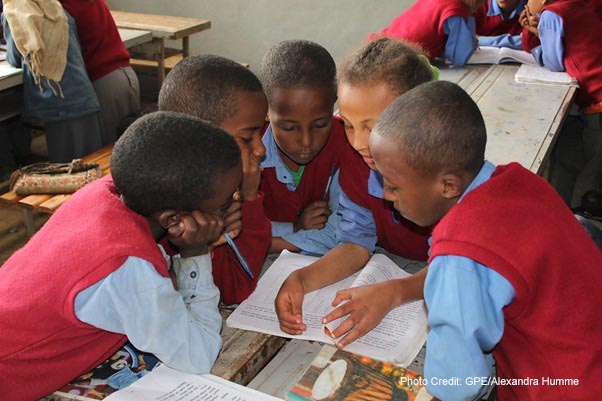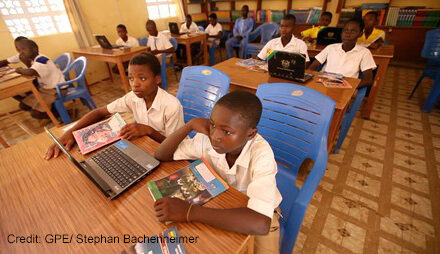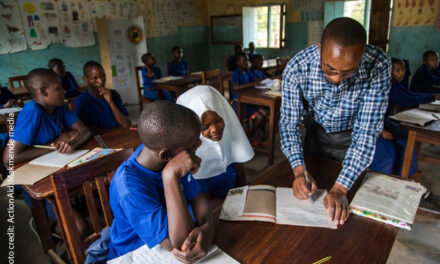This blog was written by Dawit Tibebu Tiruneh (REAL Centre, University of Cambridge) in collaboration with Nardos Chuta and Alula Pankhurst (Young Lives and RISE Ethiopia), Belay Hagos (Addis Ababa University), and Caine Rolleston (IOE, University College London). This team collaborated over six years on the RISE Ethiopia programme.
In 2023, the Ethiopian government launched an ambitious national education reform, namely the Ethiopian Education Transformation Programme (EETP). This reform aims to improve learning outcomes for all children in the general education system. To support key areas of the reform, development partners have been designing the Education Transformation Operation for Learning (ETOL) programme, set to begin implementation in January 2025. The ETOL programme builds on 16 years of the General Education Quality Improvement Programme (GEQIP) that was implemented over three phases. This blog highlights key lessons from the RISE Ethiopia research that assessed the design and implementation of the GEQIP programme to inform ETOL’s process. It is based on RISE evidence discussed with senior government officials and locally-based donor partners in Addis Ababa in July 2024, at the stage at which the ETOL programme was being designed. Government officials included those in the Ministry of Education and Amhara Region Education Bureau. Donor partners included FCDO, the Norwegian Embassy, UNICEF, and the World Bank. The key lessons discussed in this blog build on RISE Ethiopia’s experience of influencing strategies to enhance the effectiveness of national education reforms and approaches to establish strong partnerships through research on GEQIP.
Involvement of regional and local level officials during the design of national reforms is key
A key finding of the RISE Ethiopia research was that the involvement of regional governments and local actors was minimal during the design of the third phase of GEQIP (GEQIP-E, with E standing for Equity). We understood from our discussions that the RISE Ethiopia research inspired federal government officials to involve regional bureaus and woreda (district) officials as well as school leaders during the design process of the EETP and ETOL reforms. Government officials mentioned that school leaders and woreda education officials were sent a template to identify pressing needs in different areas, such as pre-primary education, foundational learning, teacher professional learning, and school leadership. The Regional Education Bureaus were encouraged and supported by the Ministry to organise several consultative workshops with school and district officials, and in some cases with selected members of the community. Outcomes from the various consultative workshops served as useful inputs during the design of the government’s EETP reform, and later the ETOL programme. It is hoped that the implementation of ETOL will continue to involve regional and local officials to ensure the programme is successful.
Revisiting the Programme for Results financing approach is needed for ETOL implementation
An important RISE Ethiopia finding was that stakeholders at regional, woreda and school levels had limited understanding of the Programme for Results (PforR) financing approach, which hindered its implementation during GEQIP-E. Moreover, donors themselves questioned whether the design of the PforR approach was fit for purpose, resulting in some tweaking of its approach over the period of GEQIP-E. In our recent discussions, government officials raised concerns about the effectiveness of PforR in the Ethiopian context, although it remains central to the financing approach for ETOL. Even so, government officials expressed their commitment to making PforR work during ETOL, informed by lessons from experience. Donor partners acknowledged PforR’s limitations in Ethiopia and stressed the need for greater flexibility in the future, particularly in addressing challenges in the most disadvantaged and lowest capacity woredas. A donor representative mentioned an ongoing programme supporting these woredas, which includes an exploratory ‘menu of options’ approach. They valued RISE Ethiopia’s insights on areas for improvement, such as ensuring stakeholders have the necessary understanding, willingness and commitment to effectively implement this financing approach. However, given the ongoing conflict, achieving and verifying results will likely remain challenging in some regions during ETOL implementation. It raises important question of who is responsible if results are not achieved due to disruptions, and that it is the students and teachers who suffer most if payments are withheld. This situation underscores the need for reconsidering the PforR financing approach for ETOL.
Increased investment in pre-primary is needed
Another key RISE Ethiopia finding is that access to at least one year of pre-primary education has significantly contributed to children’s school readiness, including in terms of narrowing inequality gaps from the early years. Based on this evidence, the team has been advocating for the continuation of the prioritisation of the early learning subsector as all subsequent education progress depends on this foundation. Government officials and donor partners indicated that useful lessons were learned over the past five years to strengthen pre-primary and primary education as central to ETOL. Government officials particularly emphasised the government’s plan to redistribute education funding from higher education to pre-primary and primary education in the coming years. This would be an important shift that our previous work also identified as needed. The redistribution of funding will enable increased investment in the pre-primary sector, including revising the curricula, preparing textbooks and teacher guides, increasing the number of qualified early years teachers, and building more dedicated classrooms for pre-primary students in existing schools. Donor partners also stressed the need to reprioritise budgets towards early childhood and basic education from higher education. They emphasised the need for donors to coordinate their finances to strengthen quality early education and hold government officials accountable. Given the introduction of new curricula and textbooks in primary schools in Ethiopia, donor partners indicated their strong support to ensure that early grade education in Ethiopia is guided by evidence on the science of learning to read, age-appropriate content, teaching at the right level, and adequately trained teachers for each grade level.
More support is needed for regions (and schools) affected by or emerging from armed conflict
The team shared preliminary findings from the Young Lives 2023 research with government officials and donor partners, focusing on the impacts of ongoing internal conflicts on student learning and wellbeing. In Tigray, the two-year armed conflict and prolonged school closures have severely affected children’s psychosocial wellbeing. Early evidence from Young Lives highlighted rising anxiety among young men and depression among young women. Similarly, ongoing conflicts in Amhara region and parts of Oromia have kept schools closed for over a year, depriving more than five million children of access to education. The RISE team stressed that ETOL would need to be designed to take explicit account of the effects of conflict on the education system, including technical and financial support to Regional Education Bureaus to prepare schools for reopening, focusing on encouraging children to return to school, planning for catch-up classes, psychosocial support, and life-skills training. Further consideration could be given to the lessons learned for keeping schooling going during crisis from the experience of COVID-19.
Importance of evidence to inform ETOL’s design and implementation
Engaging in productive dialogue with key government and donor stakeholders has been a cornerstone of the RISE Ethiopia research programme over the past six years. Our recent engagement has particularly highlighted government and donor partners’ awareness of the increasingly ambitious expectations placed on the Ethiopian general education system, despite the fiscal challenges and disruptions to the education system due to ongoing conflict in some regions. For ETOL to achieve its objectives and address some of the complex challenges the education system has faced, its design must be informed by evidence on effective practices and contextually relevant implementation strategies. We recommend adopting a similar evidence-based approach for ETOL to understand what works, how, why and for whom as implementation progresses.






I appreciate the role being played by Ethiopian Ministry of Education in bringing quality education for this generation and the generation to come! The only way to bring our country to the right track and to the sustainable development and prosperity is providing the students with quality education. However, the ministry need to try its best to improve some problems like quality school, quality exam centers, quality life for its teachers, quality and brief books for the curriculum, ……..